Why Gen. McMaster as NSA is Great for Our National Security
Lieutenant General Herbert Raymond (H.R.) McMaster, recently named as President Trump’s National Security Adviser (NSA), with his stocky build, shaved head and calm-but straight forward-manner, is a unique choice for this influential position in the new Administration. He embodies the warrior-intellectual, a recipient of the Silver Star with multiple combat tours in his 33-year military career, while also holding a Ph.D. from the University of North Carolina in History. He is an expert in military strategy and operations. As a general officer, he is accustomed to leading large, complex organizations. His most recent job was Director of the Army Capabilities Integration Center, and Deputy Commanding General, Futures, U.S. Army Training and Doctrine Command (TRADOC). In this post, it has been his job to be the subject matter expert on both future threats facing the United States and future capabilities in weapons, personnel, and technology.
General McMaster will remain on active duty, which means that the United States Senate will need to approve his new active duty assignment to the West Wing, as the Senate signs off on all assignments and re-appointments for 3 and 4-star generals. This is not unprecedented: Brent Scowcroft and Colin Powell were both active duty flag officers when they were selected as National Security Advisers in the Reagan Administration.
McMaster brings more to the table as the NSA than any person in that post in recent history. The person in this position is more than a military advisor. As head of the National Security Council, the NSA orchestrates the efforts of many agencies, including the State Department, all of the intelligence agencies under the DNI (Director of National Intelligence), the Department of Defense and the Department of Homeland Security, among others. McMaster’s tasks will involve foreign policy as well as national defense. In addition to all this, the National Security Adviser is a constant companion to the President and is one of only a few people in the West Wing who has unlimited access to the Commander in Chief.
It is important for the National Security Adviser to give the President candid and unvarnished advice. This is where McMaster is qualified to the extreme by both his experience and his disposition. His doctoral dissertation became a best-selling book,
Dereliction of Duty: Lyndon Johnson, Robert McNamara, The Joint Chiefs of Staff, and the Lies that Led to Vietnam. It is a book that explores the military's role in the conduct of the Vietnam War. It harshly criticized high-ranking officers of that era, arguing that they inadequately challenged Defense Secretary Robert McNamara and President Lyndon Johnson on their Vietnam strategy. McMaster will see it as a critical part of his job to challenge the President where appropriate and to give President Trump an honest assessment of national security matters without a lot of nuance. NSA McMaster is a loyal and dedicated Soldier, but a ‘Yes Man’ he is not. The country needs that.
His book also examines McNamara and Johnson's staff interaction with the Joint Chiefs of Staff and other high ranking military officers, and their failure to provide a successful plan of action to decisively defeat the North Vietnamese Army. McMaster also contends in this book that military operations must be clearly communicated, have measurable objectives, and an unmistakable desired end-state. It was on this basis he was critical of the Bush Administration’s conduct of the Iraq War prior to the surge, which helped turn the tide of the war. Along with his colleague General Peter Chiarelli, McMaster (as a Colonel) was influential in getting General David Petraeus to implement counterinsurgency warfare.
McMaster’s candor and commitment to these principles of speaking truth to power is unmistakable: He was passed over twice for promotion from Colonel to Brigadier General. With most career military officers, you don’t come back from that kind of slight. He did come back, without sacrificing his commitment to duty, honor, and country, a commitment that superseded his political aspirations or desire for promotion.
As a senior military leader, McMaster is clear-eyed about the national security challenges we face. He is on the record for naming “radical Islamic Jihad” as a major threat to the United States. His concerns over the aggressive actions of Russia in Europe, Syria and the Middle East led him to establish in his office at TRADOC a special study group called the Russia New Generation Warfare Study. The group’s report examines in detail what is now called Hybrid Warfare and focuses on the military, cyber, and political weapons employed by Russia in their quest for both relevance and dominance---and what should be the response of the United States. McMaster’s focus on figuring out what the Army should look like in 2025 and beyond is described by retired General Wesley Clark, the former NATO Supreme Allied Commander, as the most dramatic rethinking of the subject since the collapse of the Soviet Union 25 years ago.
Lieutenant General McMaster joins other top-tier members of the Trump Administration at a pivotal and strategic chapter in the life of our nation. After eight years of strategic equivocation, geo-political vacillation and timidity, our adversaries and enemies have never been more opportunistic, persistent and lethal. Our allies and friends have never been more anxious and ready for renewed American leadership in the world.
National Security matters. Lieutenant General McMaster, as its chief advocate and spokesman, matters as well.
